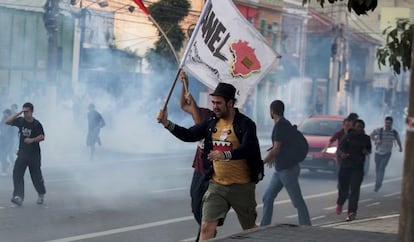Brazilian government makes concessions to quell protests before World Cup
But striking subway workers could bring São Paulo to a standstill on opening day

With two days to go before the World Cup kicks off in São Paulo, the Brazilian government has announced a deal with the organizers of the biggest protests against public spending on the sporting event.
The agreement with the Movement of Homeless Workers (MTST) should result in fewer street demonstrations for the duration of the soccer tournament and bring some relief to President Dilma Rousseff, who was watching with growing concern as back-to-back strikes and marches brought some of Brazil’s main cities to a standstill.
Despite this preliminary agreement, the subway strike is still up in the air. On Monday, striking metro workers in São Paulo caused one of the worst traffic situations in memory. The stoppages will return on Wednesday if the government of the state of São Paulo does not readmit 42 workers who were fired for participating in pickets to demand wage rises. If there is no deal, the city could experience a traffic meltdown on the day the World Cup begins.
The massive marches began in June of last year over rising public transport fares. Since then, the homeless workers movement has continued to stage protest after protest over the amounts spent on the sporting event. MTST leaders believe the government should spend more on education, healthcare and housing, just as it is spending on infrastructure for the soccer tournament.
If there is no deal, the city could experience a traffic meltdown on the first day of the World Cup
The MTST led a protest that occupied land near the Arena Corinthians, where the World Cup opening ceremony is scheduled to take place on Thursday. Its slogan is “if there is money for the Fifa Cup, there must be money for the People’s Cup.”
The construction of the stadium in the remote Itaquera neighborhood has pushed up real estate value in the area to such an extent that rents have risen 165 percent there in the last six years. This gentrification process has pushed out part of the resident population, says the MTST. One of the group’s main demands is for the government to build new housing for them. On Monday, the government pledged to create 2,000 new homes.
The movement also secured improvements to a social housing program, and the government has promised to analyze ways to improve conflict resolution in the streets. The MTST’s goal is to limit the use of force by the military police during evictions of occupied land.
President Rousseff has yielded on these points in an attempt to guarantee peace during the World Cup, following threats by MTST leader Guillerme Boulos to “radicalize” the protests if the government did not make concessions.
The other battle that the government is fighting, the subway strike, remains unresolved. On Monday, new clashes between metro workers and the police raised the tension in São Paulo. Strikers had called a protest at Ana Rosa station at 7am, but the demonstration spilled out into the street, where barricades went up and trash containers were set on fire. The military police used tear gas against the protestors and made 13 arrests.
The protest took place near a main artery, Avenida Paulista, and brought traffic to a grinding halt. By 10.30am local time, the gridlock had caused lines stretching 170 kilometers.
“It took me two hours to cover a distance I usually do in half an hour,” said taxi driver Dorivaldo Aguiar. If traffic is the same on Thursday, a cab run between the city center and the Arena Corinthians, where the opening match between Brazil and Croatia is taking place, will take two-and-a-half hours and cost around 150 reales (just under €50), he figures. On regular days, this same distance can be covered in 50 minutes for 90 reales (under €30).
The transport secretary for the state of São Paulo, Jurandir Fernandes, has made good on his promise to fire any worker who participated in the strike. Fernandes notified the 42 striking government workers of their layoff in a telegram. If this decision is not revoked, subway drivers and conductors are promising to bring chaos to the World Cup opening ceremony.
Tu suscripción se está usando en otro dispositivo
¿Quieres añadir otro usuario a tu suscripción?
Si continúas leyendo en este dispositivo, no se podrá leer en el otro.
FlechaTu suscripción se está usando en otro dispositivo y solo puedes acceder a EL PAÍS desde un dispositivo a la vez.
Si quieres compartir tu cuenta, cambia tu suscripción a la modalidad Premium, así podrás añadir otro usuario. Cada uno accederá con su propia cuenta de email, lo que os permitirá personalizar vuestra experiencia en EL PAÍS.
¿Tienes una suscripción de empresa? Accede aquí para contratar más cuentas.
En el caso de no saber quién está usando tu cuenta, te recomendamos cambiar tu contraseña aquí.
Si decides continuar compartiendo tu cuenta, este mensaje se mostrará en tu dispositivo y en el de la otra persona que está usando tu cuenta de forma indefinida, afectando a tu experiencia de lectura. Puedes consultar aquí los términos y condiciones de la suscripción digital.








































